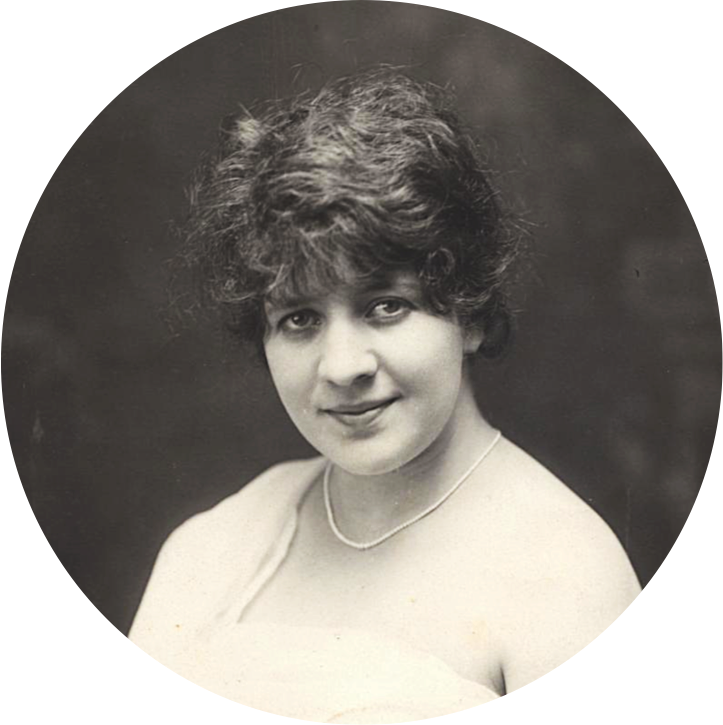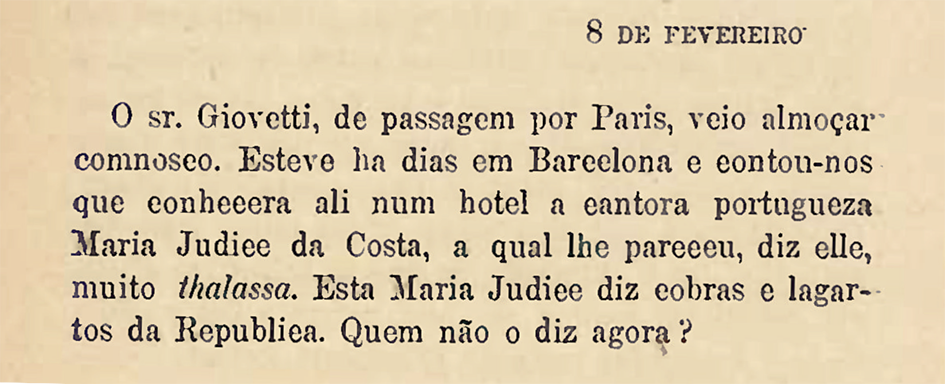
Maria Bárbara Bicker Júdice da Costa, born on the 12th of June of 1870, in Lisbon, was the most acclaimed Portuguese lyric singer of the nineteenth century, having also obtained, as Luísa Todi did a century before, a tremendous international success.
Hailing from a family with a predisposition for the Arts, she demonstrated, already as a child, uncommon skills for theatre performance. During her artistic formation, undertaken between the ages of 9 and 19 at the National Music Conservatory, where she entered with the intent of studying piano, she ended up being advised to pursue singing.
After winning various prizes while she was still a student, Maria Júdice made her stage debut in 1888, at the S. Carlos Theatre, having accomplished, already during her second show, the feat of being called to the royal tribune, where she was introduced to King Oscar II of Sweden, who was in attendance in the company of Queen Maria Pia of Savoy. In 1890, she performed her opera debut at the same theatre, which she followed with more operas and an equal number of high compliments. Such merits would allow her to travel to Italy, as a scholarship recipient of the Government, so as to perfect her vocal skills.
Following her Italian stage debut in that same year of 1890, in Padua – for which she received much praise from critics and the press – she was hired to perform in Odessa and, shortly afterwards, in Moscow, where she lived until 1891, before returning to Italy. At this point, her career took off and she travelled the world, performing in the most diverse countries, such as Cuba, Mexico, Argentina, Brazil, Uruguay, Spain and Holland, in addition to frequent returns to Italy and Russia.

Comentário sobre Maria Júdice da Costa no Diário de João Chagas.
Regarded as the world´s best performer, in the Italian language, of the character Brünnhilde, from Wagner´s opera The Valkyrie, Maria Júdice played opposite Ângelo Masini, one of the greatest tenors of the nineteenth century, on several occasions.
She returned to Portugal to perform at the recently built Lisbon´s Coliseum, in 1906 (for two months), 1910 and 1913. In 1922, she abandoned singing, marking her farewell with performances at the S. Carlos Theatre and the Circus Theatre of Braga.
From that moment on, she dedicated herself exclusively to acting, her childhood passion, having performed in several plays, alongside names such as Amélia Rey-Colaço and Robles Monteiro. During this period, she also joined, in 1921, the cast of two films produced by Invicta Film, a production company based in Porto: Amor de Perdição (Doomed Love) – the first adaptation to the screen of the renowned novel by Camilo Castelo Branco, directed by Georges Pallu – and Mulheres da Beira (Women of the Beira Province), helmed by Rino Lupo.
Moreover, she participated in the film Fátima Milagrosa (Miraculous Fátima), also under the direction of Rino Lupo. She continued acting in theatres until 1938, the year in which she retired from the stages.
Maria Júdice da Costa died on the 16th of May of 1960.
*****
Maria Bárbara Bicker Júdice da Costa, nascida a 12 de Junho de 1870, em Lisboa, foi a mais aclamada cantora lírica portuguesa do séc. XIX, tendo igualmente alcançado, à semelhança de Luísa Todi no século anterior, um estrondoso sucesso internacional.
Proveniente de uma família com predisposição para as artes, Maria Júdice já demonstrava, enquanto criança, invulgares dotes para o teatro. No decurso da sua formação artística, realizada entre os 9 e os 19 anos de idade, no Conservatório Nacional, onde se inscrevera com o intuito de estudar piano, acabou por ser aconselhada a enveredar pelo canto, por recomendação do seu mestre António Melchior Oliver.
Já com diversos prémios arrecadados ainda enquanto estudante, estreou-se em público em 1888, no Teatro S. Carlos, tendo conseguido, ao segundo espectáculo, a proeza de ser convocada à tribuna real, onde foi apresentada ao rei Óscar II da Suécia, que lá se encontrava na companhia da rainha D. Maria Pia. Em 1890, deu-se a sua estreia na ópera do mesmo teatro, a que se seguiram mais óperas e outros tantos rasgados elogios, que lhe haveriam de permitir viajar para Itália enquanto bolseira do Governo, com o intuito de aprimorar as suas capacidades vocais.
Na sequência da sua estreia em palcos italianos nesse mesmo ano de 1890, em Pádua – levando a crítica e a imprensa a renderem-se ao seu potencial artístico – foi contratada para Odessa e, mais tarde, para Moscovo, onde residiu até 1891, altura em que regressou a Itália, para actuar novamente em Pádua e também em Roma. Seguidamente, a sua carreira despontou – percorreu o mundo, pisando palcos dos mais diversos países, como Cuba, México, Argentina, Brasil, Uruguai, Espanha e Holanda, para além de retornos regulares a Itália e à Rússia.
Considerada a melhor intérprete mundial, na língua italiana, da personagem Brunilde, da ópera A Valquíria, de Wagner, Maria Júdice contracenou, em diversas ocasiões, com Ângelo Masini, um dos maiores tenores do séc. XIX.
Regressou a Portugal para actuar no âmbito de alguns recitais em várias cidades, em 1896, para actuações no Coliseu dos Recreios, em 1906 (durante 2 meses), 1910 e 1913. Abandonou o canto em 1922, despedindo-se com actuações no Teatro S. Carlos e no Teatro Circo de Braga.
A partir desse momento, dedicou-se exclusivamente à representação, a sua paixão de infância, tendo actuado em variadas peças, ao lado de nomes como Amélia Rey-Colaço e Robles Monteiro. Durante este período, integrou ainda, em 1921, o elenco de dois filmes produzidos pela produtora portuense Invicta Film: Amor de Perdição – primeira adaptação do célebre romance de Camilo Castelo Branco ao cinema, pela mão de Georges Pallu – e Mulheres da Beira, realizado por Rino Lupo. Também sob a direcção de Rino Lupo, foi actriz no filme Fátima Milagrosa, em 1928. Continuou a representar, em teatro, até 1938, ano em que se retirou definitivamente dos palcos.
Maria Júdice da Costa morreu a 16 de Maio de 1960.
References:
- CASTRO, Zília, ESTEVES, João (dir.), Dicionário no Feminino (séculos XIX-XX), Lisboa, Livros Horizonte, 2005.
- VILAR, Anita, Panorama de uma História Local no Feminino, Centro de Estudos Bocageanos, 2013.
- Diário de João Chagas: 1915, 1916 e 1917, Livraria Editora, Lisboa, 1929, p. 37.